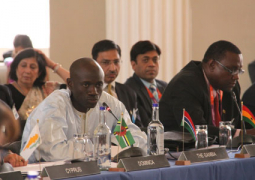The Kanifing Magistrates' Court, presided over by Magistrate Abdoulie Mbacke recently acquitted and discharged a butcher who was charged with stealing.
Neeraj Sharma was acquitted and discharged following a no-case-submission by his Defence Counsel Badou Conteh, who earlier informed the court that he had filed a no-case-submission, a copy of which was also given to the prosecution.
Prosecuting Officer, ASP Bojang applied under Section 68(1) of the Criminal Procedure Code to withdraw the case. Badou Conteh then rose to say that the prosecution could not withdraw the case. As he put it, the accused had already opened his defence by filing a no-case-submission.
He argued that what the court could do was to acquit the accused, noting that the prosecution had passed the stage of withdrawing the case.
ASP Bojang challenged that the prosecution was within the time and their application to withdraw the case was properly done. He referred the court to Section 68(1) of the CPC which states among others things, that the prosecution can withdraw any case before a court at any stage of the proceedings, either in part or whole before the announcement of judgment.
In his ruling, Magistrate Mbacke told the court that after the no-case-submission made by the Defence Counsel the prosecution had decided to make an oral application for the withdrawal of the case in question.
He further stated that Section 68(1) of the Criminal Procedure Code entitles them to do so at any stage of the trial before judgment.
According to him, subsection two of Section 68 of the Criminal Procedure Code made it crystal clear that if the prosecution closes their case and the accused commences his defence, then the withdrawal of the case by the prosecution entitles the accused to be discharged and acquitted of the offence charged.
He further indicated that in the case under review, the accused had opened his defence by getting his Counsel to file a written submission of no-case-to-answer, which according to subsection two of Section 68 of the CPC, entitles the accused to be discharged and acquitted of the offence with which he was charged.
He finally stated that it was the view of the foregoing that the court was obliged to rule in favour of the Defence.
Consequently, he acquitted and discharged the accused.


